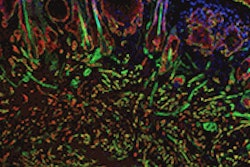Dear Oral Cancer & Diagnostics Insider,
Oropharyngeal cancer patients treated with combined chemotherapy and radiation therapy reported a decrease in their voice and speech quality after treatment, according to research presented at the recent Multidisciplinary Head and Neck Cancer Symposium.
But the study also revealed a notable difference between patients' reports of adverse effects and physicians' assessment. Read more in this latest Insider Exclusive.
Avoiding the contralateral submandibular gland during radiation therapy is feasible and safe with advanced stage, node-positive head and neck cancer (HNC) and base of tongue lesions, according to another study presented at the symposium. Read about the other salutary effects this approach offers for patients.
In other Oral Cancer & Diagnostics Community news, the rate of oropharyngeal squamous cell carcinoma (OPSCC) has shown an alarming increase among young adults, and the human papillomavirus (HPV) may be to blame, according to a new study in Otolaryngology -- Head and Neck Surgery. Read what researchers say is behind the growth of HPV-related OPSCC and the surprising differences among racial groups.
And the type of cancer stem cells, rather than the number, is a better predictor of the survival of patients with HPV-related head and neck cancer. Click here to read about the surprising findings described in a new study in Cancer that compares HPV-positive tumors with HPV-negative tumors.
Meanwhile, researchers using a new genetic screening technique have found seven new tumor-suppressor genes in HNC whose role in cancer was previously unknown, according to a new study in Science. Read about the new technique that eliminates certain genes to identify the ones that are critical for cancer.
Patients with HNC who received intensity-modulated radiation therapy had better survival rates than those who received conventional radiation treatment -- the first indication of a survival benefit for the more complex technique. Click here to find out what researchers from the University of Texas MD Anderson Cancer Center found about the therapy's side effects as described in a new study in Cancer.
Also, a simple protein test could be more useful in predicting the survival of patients with HNC compared with existing methods, according to a recent study in Clinical Oncology. Click here to read about the pivotal role the p16 protein plays in patients' survival.
In a related story, researchers have discovered a new saliva test for oral cancer that could reduce false-positive results. Read about the quest to find reliable oral cancer salivary biomarkers, which can be used as indicators of disease or other health conditions.
Finally, in another story about screening, a test that is traditionally used to screen cervical cancer in women could also be an effective, noninvasive method to spot oral cancer. Click here to read which test has potential in the early detection of oral cancer, one of the leading causes of death in India.



















